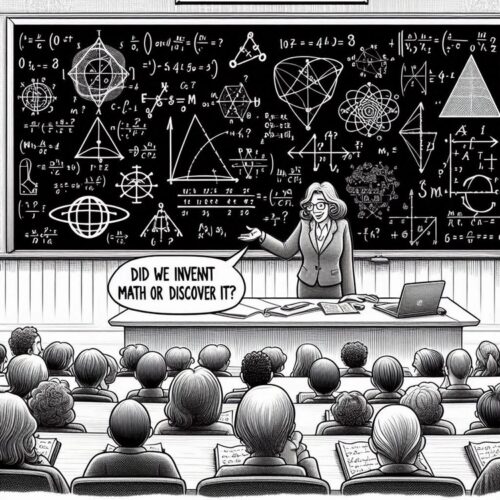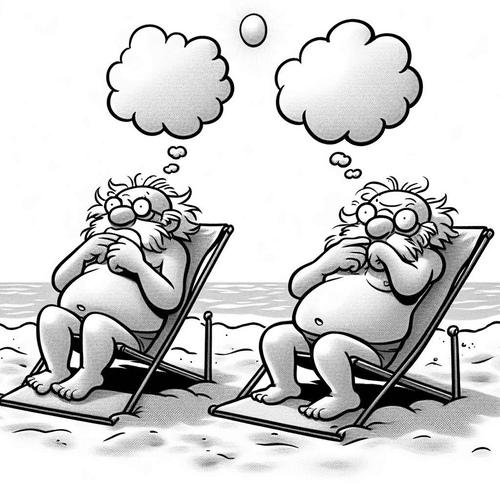Does Math Reveal the Mind of God? The Divine Design in Numbers
When Galileo declared mathematics is the language in which God wrote the universe, was he merely waxing poetic? Consider this: the same mathematical principles that govern the dance of subatomic particles also orchestrate the movement of galaxies. The equations scratched on a mathematician’s chalkboard today somehow predicted the behaviour of black holes centuries before we discovered them. This extraordinary harmony between abstract mathematical thought and physical reality presents us with a profound mystery: Why does the universe submit so perfectly to mathematical description? Could it be that in studying mathematics, we aren’t merely manipulating symbols, but tracing the very thoughts of a divine Mind?
Does mathematics simply exist in human minds, or does it point to something—or Someone—transcendent?
THE NATURE OF MATHEMATICAL TRUTH
Does math reveal the mind of God? Consider a simple mathematical truth: 2 + 2 = 4. This statement holds true regardless of human opinion, cultural context, or historical period. It was true before humans existed and would remain true even if humanity disappeared. Mathematical truths possess a peculiar kind of necessity that sets them apart from other forms of knowledge.
This characteristic raises a compelling question: How can abstract mathematical concepts so perfectly describe physical reality? The Nobel laureate Eugene Wigner termed this “the unreasonable effectiveness of mathematics.” Time and again, mathematical formulations developed in pure abstraction have later proved precisely applicable to physical phenomena. Maxwell’s equations predicted radio waves before we discovered them. Einstein’s mathematics predicted gravitational lensing before we observed it. The mathematical framework of quantum mechanics continues to predict experimental results with astonishing precision.
What is Fibonacci’s Sequence, and how does it point to God? Fibonacci’s Sequence is a series of numbers where each number is the sum of the two preceding ones, beginning with 0 and 1 (e.g., 0, 1, 1, 2, 3, 5, 8, and so on). This sequence appears frequently in nature, from the arrangement of leaves on a stem to the spirals of shells and even the proportions of the human body. Its widespread presence suggests a consistent pattern woven throughout creation, leading some to see it as evidence of an intentional and intelligent Designer who structured creation with mathematical order and beauty. Many view the Fibonacci Sequence as a glimpse into the mind of God, revealing a purposeful pattern underlying natural complexity. FOR MORE, DO READ OUR POST: Sacred Symmetry: How Fibonacci Numbers Reveal God’s Design
DIVINE ATTRIBUTES REFLECTED IN MATHEMATICAL PROPERTIES
The nature of mathematical truth reveals attributes that parallel our understanding of divine nature. Consider three key characteristics:
- Infinity and Eternality: Mathematics naturally encompasses the infinite. From the endless sequence of natural numbers to the concept of infinity itself, mathematics handles what is boundless and eternal with remarkable precision. These concepts point to realities beyond our finite physical experience, suggesting truths that transcend the material world.
- Order and Logic: Mathematical truth exhibits perfect internal consistency and logical necessity. From simple arithmetic to complex theoretical frameworks, mathematics displays an orderliness that reflects divine rationality. The beauty of mathematical proof—often described by mathematicians as “elegant” or “beautiful”—suggests a mind behind the mathematics, one that values both truth and beauty.
- Sovereignty and Necessity: Mathematical laws operate with absolute authority across all creation. No physical process can violate mathematical truth; no force can make 2 + 2 equal 5. This sovereignty over natural law points to a deeper order underlying reality itself.
CREATION’S MATHEMATICAL FRAMEWORK
The physical universe exhibits a profound mathematical structure. Consider these observations:
Fine-Tuning and Constants: Consider the profound complexity in mathematics, especially in fields like physics and biology. Universal constants—the speed of light, gravitational constant, and Planck’s constant—are finely tuned to values that make life possible. If these constants were even slightly different, life as we know it would not exist. This level of precision is so improbable that some scientists suggest an intelligent designer as a more plausible explanation than chance alone. Take, for instance, the way the Earth’s position within the solar system perfectly allows for liquid water, a stable atmosphere, and a moderate climate. This “fine-tuning” goes beyond mere coincidence, hinting at purposeful design. When scientists like Sir Roger Penrose calculate the near-impossibility of such a universe emerging by chance, we’re left to wonder: could these constants reflect the wisdom of a divine mind?
Mathematical Description of Natural Laws: Physical laws take mathematical form with remarkable consistency. From quantum mechanics to cosmic expansion, mathematics describes reality with extraordinary accuracy. This mathematical intelligibility suggests a rational Creator who intended the universe to be comprehensible to rational minds.
IMPLICATIONS FOR FAITH AND REASON
Integration of Mathematical and Theological Understanding
The mathematical nature of reality encourages us to see scientific and mathematical study as a form of divine revelation. When we uncover mathematical truth, we glimpse the rationality embedded in creation—a rationality that points to the Divine Mind behind it all.
This perspective transforms mathematical study from mere academic exercise into something approaching worship. Each mathematical discovery becomes an opportunity to appreciate divine wisdom and order.
Practical Applications
This understanding has profound implications for how we approach both faith and learning:
- The integration of faith and reason finds solid foundation
- Scientific endeavour becomes an exploration of divine creativity
- Mathematical study takes on spiritual significance
CONCLUSION: SO, DOES MATH REVEAL THE MIND OF GOD?
Mathematics reveals a universe of extraordinary order, beauty, and rationality. Its transcendent truths, perfect consistency, and remarkable effectiveness in describing physical reality point beyond themselves to their source. In mathematics, we find evidence of a rational, orderly, and wise Creator who has structured reality itself in mathematical terms.
As we pursue mathematical truth, we follow the thoughts of God after Him. Each equation solved, each pattern discovered, each proof completed draws us closer to understanding the divine mind that conceived it all. Mathematics thus becomes more than an academic discipline—it becomes a window into the very nature of reality and its Creator.
In this light, the study of mathematics takes on new significance. It becomes both an intellectual pursuit and a spiritual journey, revealing the fingerprints of a Creator who delights in both truth and beauty, order and elegance.
Does Math Reveal the Mind of God?—Related FAQs
- Was math invented by man, or merely discovered? While we certainly develop mathematical notation and systems to express mathematical concepts, the underlying mathematical truths themselves exist independently of human minds. When ancient civilizations across continents discovered the Pythagorean theorem, they weren’t inventing different versions of truth—they were uncovering the same fundamental reality. The fact that mathematical truths remain consistent across cultures and time periods suggests they are discovered rather than invented, much like how gravity existed before Newton articulated its laws. This discovery view aligns with the understanding that mathematical truth reflects an eternal, unchanging divine mind.
- What is the Quantum Cosmological Argument? Is it a showstopper for faith in God? The Quantum Cosmological Argument suggests quantum mechanics allows universes to emerge spontaneously from nothing, potentially eliminating the need for a Creator. However, this argument misunderstands both “nothing” and quantum mechanics—the quantum vacuum it refers to is actually a highly structured state governed by mathematical laws, not true nothingness. The very existence of these mathematical laws governing quantum behaviour requires explanation, as does the remarkable fine-tuning of quantum constants. Rather than eliminating the need for God, quantum mechanics reveals another layer of mathematical elegance in creation that points to divine design.
- What are human construction arguments? Human construction arguments posit mathematics is purely a human invention, like language or art, with no independent existence outside human minds. These arguments often point to the historical development of mathematical concepts and the existence of different mathematical systems as evidence for their position. However, they struggle to explain why mathematics works so consistently in describing physical reality and why different cultures discover the same mathematical truths independently. The universal applicability and objective nature of mathematical truth suggests it transcends human construction.
- How do we respond to mathematical nominalism? Mathematical nominalism—the view that mathematical objects don’t really exist and are merely useful fictions—fails to account for mathematics’ extraordinary effectiveness in describing and predicting physical reality. If mathematical objects were mere fictional constructs, their perfect correspondence with physical reality would be inexplicable. The precision with which mathematical models predict previously unknown phenomena suggests mathematical truth has objective reality beyond human mental constructs. Moreover, nominalism struggles to explain why mathematical truths appear to be necessary rather than contingent.
- Where do we stand on the Platonism vs Conventionalism debate? This foundational debate in mathematics centres on whether mathematical objects exist in an abstract realm (Platonism) or are merely useful conventions we’ve adopted (Conventionalism). Platonism better explains mathematics’ remarkable effectiveness in describing reality and its apparent necessity and universality. However, rather than positing an independent realm of mathematical objects, we can understand mathematical truth as grounded in the divine mind—eternally existing thoughts of God. This view preserves the objective reality of mathematical truth while avoiding the metaphysical difficulties of abstract realms.
- What is mathematical realism? Mathematical realism holds that mathematical objects and truths have objective existence independent of human minds or conventions. This view explains why mathematics works so consistently in describing physical reality and why mathematical truths seem necessary rather than contingent. Mathematical realism aligns with the understanding that mathematical truth reflects divine thought—existing necessarily and eternally in the mind of God. This perspective makes sense of both mathematics’ abstract nature and its concrete effectiveness in describing creation.
- What are multiple mathematical systems? Multiple mathematical systems (like different geometries or algebraic systems) might seem to challenge the idea of mathematical truth as absolute, but they actually demonstrate the coherent unity of mathematical truth. These systems, while different, are internally consistent and often interconnected in profound ways. Rather than contradicting each other, they reveal different aspects of mathematical truth—much like how different perspectives on a three-dimensional object give different but compatible views. Their underlying unity points to a single, comprehensive mathematical reality.
- How do we respond to the argument: Math doesn’t prove God, it’s simply practical? Sure mathematics alone doesn’t constitute a formal proof of God’s existence. However, its nature and effectiveness raise profound questions that naturalistic worldviews struggle to answer. The remarkable correspondence between abstract mathematical truth and physical reality, the eternal and necessary nature of mathematical truth, and the fine-tuned mathematical structure of the universe all point toward a rational, personal Creator. Mathematics’ practicality itself requires explanation—why should abstract mathematical concepts map so perfectly onto physical reality unless both originated from the same divine mind?
- Isn’t math simply a tool we use to describe the world? While mathematics certainly functions as a descriptive tool, this view fails to explain why it works so extraordinarily well—what Eugene Wigner called the “unreasonable effectiveness of mathematics.” The fact that purely abstract mathematical concepts repeatedly prove applicable to physical reality suggests mathematics is more than just a human tool. Mathematics’ predictive power—revealing aspects of reality before we observe them—indicates it touches something fundamental about the nature of reality itself. This deep connection between mathematical truth and physical reality points to a common source in the divine mind.
How do Kurt Gödel’s Incompleteness Theorems point to God? Gödel’s Incompleteness Theorems (1931) are among mathematics’ most profound discoveries. The First Theorem proves that in any consistent mathematical system complex enough for basic arithmetic, there will always exist true statements that cannot be proven within that system. The Second Theorem goes further, showing that such systems cannot prove their own consistency. These revolutionary findings shattered the dream of creating a complete mathematical system that could prove all true statements, revealing inherent limitations in formal mathematical systems.
This discovery powerfully points to God in several ways. The theorems reveal mathematical truth transcends our ability to prove it—truth exists independently of our capacity to demonstrate it formally. Just as we can recognise the truth of Gödel sentences (statements that are true but unprovable within their system) from outside the system, this suggests the existence of a transcendent divine mind that comprehends all truth completely. The theorems effectively demonstrate that truth is bigger than proof, challenging materialist assumptions that human reasoning could fully capture reality in formal systems. Instead, they point to an absolute, divine foundation for truth itself—a mind that knows and upholds all truth, even those truths that finite human systems cannot reach.
Does Math Reveal the Mind of God?—Our Related Reads
- Sacred Symmetry: How Fibonacci Numbers Reveal God’s Design
- The God Equation: Quantum Physics and the Evidence for Design
Editor's Pick

The Throne-Room Vision: Who Did Isaiah See?
The scene is unforgettable: Isaiah stands in the temple, and suddenly the veil between heaven and earth tears open. He [...]

The Angel of the Lord: Can We Be Certain It Was Christ All Along?
Throughout the Old Testament, a mysterious figure appears: the Angel of the LORD. He speaks as God, bears God’s name, [...]

The Doctrine of Providence: Does God Really Govern All Things?
You’re sitting in the doctor’s office when the diagnosis lands like a thunderclap. Your mind races: Why this? Why now? [...]
SUPPORT US:
Feel the Holy Spirit's gentle nudge to partner with us?
Donate Online:
Account Name: TRUTHS TO DIE FOR FOUNDATION
Account Number: 10243565459
Bank IFSC: IDFB0043391
Bank Name: IDFC FIRST BANK






